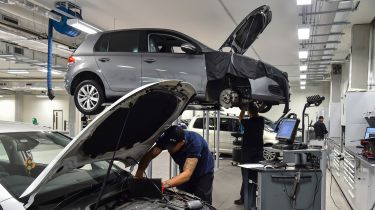What does a car service include?
Servicing your car is essential to keeping it roadworthy. But do you know what is included in a car service? Here's everything you need to know

Looking after your car with regular servicing is the best way to avoid breakdowns and protect the car’s value. There are different levels of car service work depending on the make, model, and mileage. Knowing what should be part of your car’s health check-up is also essential to getting the best value, so here’s our guide to what a car service includes.
What is a car service?
At its simplest, a car service is a regular check of its mechanical parts for wear and the fluids that keep it running smoothly. Some drivers choose to do this themselves, but most book their car into a garage for a professional mechanic to look over the car.
A car service will be needed at regular mileage or time intervals - check your owner’s manual or dealer for this. Typically, services are required every 12,000 miles or 12 months, and you should book the car in based on which of these key markers comes first.
If you only cover a small mileage every year, say 4000 miles, you should have the car serviced annually. On the other hand, high-mileage drivers racking up 20,000 miles a year should get their car serviced at the recommended mileage interval rather than wait 12 months between checks.
Based on the car’s overall mileage and use, it might need a major or minor service. Usually these alternate and a major service will include everything from the minor service plus further checks and replacing fluids for the brakes and coolant. When the service has been completed, expect to see a sheet detailing all of the work carried out.
What does a car service include?
How much work is carried out in a car service will be based on the car’s age, mileage, and where you have it serviced. Some garages will offer a more cursory check than others, so choose your mechanic carefully.
A full service, either minor or major, will include changing the engine oil and filter, checking all of the fluid levels for the coolant, wipers, gearbox, brake fluid, and power steering - and topping up or changing as necessary.
The service should also ensure all of the lights and electrics work properly, the battery and charging system are performing as they should, and any update to the car’s electronics. This last point is something not every garage can do, so ask if it’s something the garage offers.
While in for a service, the car’s suspension, brakes, exhaust, tyre condition and pressures, wheels, and bodywork should all be inspected. Any worn or damaged parts should be repaired or replaced.
There are three main types of service - minor (sometimes called interim), full, and major. A minor service should include all the above, while a full service will also look at the fuel and air filters, hoses, and handbrake. With a major service, expect the cabin air filter to be replaced, along with spark plugs, brake fluid, and also possibly longer-term items such as the engine’s cam belt, pulleys, and water pump.
What is the difference between an MoT and a service?
There are three fundamental differences between a car service and an MoT. The MoT test is a legal requirement for any car that’s three years old and more in the UK. The MoT test is a safety and emissions inspection, and failing it can mean your car is not allowed on the road until faults are fixed. Lastly, an MoT tester will only point out problems - they will not fix them unless you specifically ask the garage to do so as part of the MoT work.
Servicing your car is not a legal requirement, although it is often needed to maintain your car’s warranty. A service should cover all safety items, but it is not a guarantee that your car is road legal.
Many drivers have their car serviced and MoT’d at the same time, which saves two trips to a garage. This also means you can solve any faults before the car is MoT tested so it gets a clean pass with no advisory items. When you buy a used car, many dealers will include a fresh service in the price, but make sure it is a full service rather than an interim one.
How much is a car service?
How much you pay for a car service comes down to a number of factors. Which garage you use is an important decider in how much it will cost because manufacturer dealer servicing is generally more expensive but comes with the peace of mind of mechanics specifically trained to look after your car. Independent garages can be just as good but are usually less costly.
Another key point in how much a car service will cost is which service is needed, and how much work is required. If it’s a minor or interim service and the car just needs a quick oil and filter change, you might pay as little as £75 at a local garage or fast-fit centre. A full service at a dealer or good independent is likely to cost between £200 and £350, but look on this as an investment against the risk of breaking down. A major service for a premium brand at a dealer in a city centre could run to more than £500.
One other cost to consider is if you borrow a courtesy car while your own is being serviced. Even garages that say this is a free service will wrap up the cost of the courtesy car and its insurance in the bill you pay for servicing.
How long does a car service take?
When your car is booked in for a service, you will often be asked to drop it off first thing in the morning and collect it at the end of the day. It doesn’t usually take all day to service a car, but the garage likes to have some flexibility in case part of the job takes longer than expected.
Most normal car services take around 1.5 hours, while a full service is 3 hours. A major service of a more complicated car, such as one with four-wheel drive or changing the engine’s vital belts, could take five hours. This will also affect how much you pay as the garage will charge labour at an hourly rate.
Frequently Asked Questions
The owner’s manual for your car will tell you how often you should have it serviced. It will usually give this in miles and months, such as 12,000 miles or 12 months. You should always go with whichever of these numbers comes round soonest. If you cover very few miles each year, take the car for a service every 12 months. Or, if you cover plenty of miles, don’t wait until 12 months are up - get the car serviced at 12,000-mile intervals.
Regular servicing is vital to keep your car’s mechanical and electrical components in good condition. A full service history and the correct stamps in the service record will also help you get the best price when you come to sell the car.
Want to know more about looking after your car? Read our guides on how to check your engine oil and the age of your tyres…
Find a car with the experts








